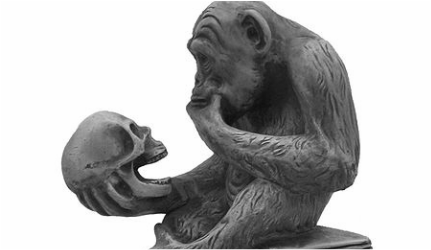Organisms learn to avoid unpleasant or hurtful stimuli. A princess removes from her bed the pea affronting delicate, royal skin. Rotting, aching teeth can be extracted by various means: lay and professional. But it's been only with the rise of modern medicine and surgery that we have been able to treat some of the causes of profound suffering that lie in remote and previously inaccessible parts of the body. This has led me to wonder, "What is the evolutionary function of such deep pain?" |
"The Problem with Pain"By Eugene E. Lemcio
What Mind or Force laid miles of sleek neuronic tracks to serve trunk lines and boondock junctions yet contrived to mark the vital routes “One Way:” to make deliveries but not allow exchange? Who authorized a mouse to pluck the thorn that pierced a lion’s paw and lets kids yank a rotting tooth by home-style remedy of string and slamming door (all free of charge) but won’t remove the hurt of cleaving leucocytes, despite the largest dose of chemotherapy or morphia? Let us give unbegrudging thanks for all those victims who at last survive. But what of generations past and current tribes who never could nor can respond to suffering profound as this? Are they and we descendants of a line of beasts and homo sapiens-- from which we by default devolved-- whose conscious thought, or autonomic flex (or way of life) defeated cells gone wild in helpless viscera? Or was our judgment to evolve with symmetry deplete: sophisticated systems of alarm that lead us to the source but don’t effect the cure? What tragic, mocking waste. We limp, erect but half the time until some complementary design can give such pain a worthier reply. |
Eugene Lemcio, Emeritus Professor of New Testament at Seattle Pacific University, taught there for thirty-six years. He earned an M.Div. from Asbury Theological Seminary and a doctorate from Cambridge University (Trinity College). Gene began his academic career at Houghton College with a B.S. in zoology (and a minor in chemistry).
Eugene came to faith among a tiny congregation of pre-WW1 and post-WW2 Ukrainian Baptist immigrants in Chester, PA. Later immersion in the intellectual and spiritual traditions of Anglo-Methodism acquainted him with the so-called "Wesleyan Quadrilateral": Scripture, reason, tradition and experience (=experiment). |


